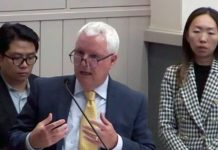Seeking to come to terms with a mixed appeal court ruling, South Pasadena City Manager Arminé Chaparyan this week is asking the City Council to “take action” to forego recovery of at least quarter million dollars in Utility User Tax (UUT) revenue that Southern California Edison failed to collect on behalf of the City from South Pasadena ratepayers.
The City would also forego five years of penalties and interest on its claim against Edison, and “instead focus” on preventing further under-collections going forward. The recommendation, prepared by City Attorney Andrew Jared, is on the consent agenda for Wednesday evening’s council meeting.
The item makes clear that the City won’t sue every ratepayer in town to collect $25.00, and the City Council will approve a resolution to that effect. But it does not make clear whether it will withdraw from a lawsuit South Pasadena and over three dozen other cities have been pursuing against Edison for a year and a half. The “SCE Coalition” was initiated by Michael Colantuono, the main partner at Jared’s law firm, Colantuono, Highsmith & Whatley. To date CHW, which also serves as South Pasadena’s legal counsel, has billed the city over $3,000 for the case.
Jared told the South Pasadenan News he could not discuss legal matters, while Chaparyan had not had time to respond to written questions by press time.
The City’s 7.5 percent UUT applies to electricity, phone and other services. It’s the city’s second largest revenue source, bringing in $3.5 million a year. The electricity tax revenue is the largest share of that, worth $1.3 million.
Under many cities’ UUT ordinances, the service provider, in this case Edison, is responsible for calculating, collecting and remitting the tax to the City. But in 2018, the finance director in Torrance discovered that Edison was under-collecting the tax by misapplying state-funded credits given to ratepayers to mitigate the cost of a “cap and trade” program designed to reduce greenhouse gas emissions. Instead of basing the tax on the full value of energy used, Edison based it on that value less the credit, depriving cities a significant portion of their UUT tax revenue.
“Edison has refused to correct its error and benefits from it,” Colantuono and co-counsel John L Jones II wrote in the cities’ June 2020 lawsuit. “It collects millions of dollars from the California Public Utility Commission to cover the credits, sells its power at full rates, but diverts tens of millions of dollars annually from the treasuries of the cities. This scheme costs Edison nothing and allows it to reward its largest customers and to subsidize the price of its service, encouraging more power use in a state trying to conserve.”
For Torrance, which has four oil refineries and other large power users, the loss was in the millions. Torrance sought to recover the money from Edison by filing a lawsuit in June 2019. It hired Colantuono for the job.
Colantuono estimated that as many as 160 California cities and counties were getting the same treatment from their utilities as was Torrance. That meant not only that the cost of the litigation could be spread out among multiple plaintiffs, but that the prospective payout could be in the hundreds of millions of dollars.
Colantuono began by representing only Torrance against Edison. But he lost the first round in 2020 when LA Superior Court Judge Barbara Scheper ruled the under-collection complied with Torrance’s ordinance.
Colantuono appealed. Last March, he won a ruling that reversed Scheper’s decision but had a poison pill. Yes, Edison should have calculated, collected, and remitted the tax funds as Torrance argued before applying the credit, but the court could not order Edison to hand over money it did not collect. To recoup, Torrance and any similarly situated city would have to individually sue the ratepayers who owe the money, that is, every ratepayer in their jurisdiction.
That was a problem. Cities with large industrial customers could confine legal actions to large users who owed the most. Torrance worked out a settlement with one industrial for nearly a half million dollars.
But there was no viable action for cities like South Pasadena that have no large power users. South Pasadena is home to 12,000 ratepayers, but all of them are small residential or commercial consumers. Colantuono estimated each of these customers was under-charged an average of $5 per year for five years.
“It’s not going to be practical or perhaps politically wise to go chase small amounts from every electricity user,” Colantuono conceded in a rare statement to the Daily Breeze last April. “You don’t go chase $25 with a lawyer.”
Nevertheless, a day after the appeal court ruling, Colantuono sent a letter to SCE Coalition members laying out terms under which CHW would represent them in a new suit against Edison arising from the Torrance case. Joining members would have to pay a share of the cost of the litigation to date, divided among clients “in proportion to the amounts they have at stake.”
Thirty-eight cities within Edison’s service territory signed up for the case, including South Pasadena, Santa Barbara, Santa Monica and Moreno Valley. Each was provided an estimate of what they had at stake. For example, the city of San Marino was told it had $96,460 in under-collected UUT.
In explaining this week’s recommendation that South Pasadena drop its UUT recovery effort, City Attorney Jared said the expense of suing every electric customer in town wouldn’t be cost-effective.
But on behalf of Torrance, Colantuono in August filed an amended complaint with the superior court asking it to “order Edison to pay restitution of the electricity tax revenues the city has lost to date.”
Neither Jared’s agenda item nor CHW’s amended complaint explain why, if the appeal court forbade recovery from Edison, it still makes sense for Torrance but not South Pasadena to seek restitution from Edison.
On Oct. 20, just under two weeks after the City received a public records request for information about the case, the City Council held a closed session during which it received a briefing on the case from CHW. A week later, Wednesday’s agenda item was published.
Again, neither CHW nor the City will discuss litigation. Nor has the City responded to the public record request. Attorneys representing the Client Relations Committee CHW set up for SCE Coalition members are also unwilling to comment, saying that even the dates of their occasional meetings are confidential.
But there are some indicators. Of the over three dozen SCE Coalition members, South Pasadena is the only one that has been publicly asked to drop its recovery effort. This is the case even though CHW is the general counsel for three of the coalition cities and special counsel to 10 more.
Moreover, the electric utility tax ordinances in Torrance and South Pasadena are different. Torrance’s UUT says that if a ratepayer doesn’t pay the full amount of the charge and tax for a billing period, a proportionate share of both “shall be deemed to have been paid.” In his amended complaint, Colantuono appears to be relying on this provision to convince the court that Edison is still liable for prior under-collections.
South Pasadena’s UUT has no such clause.
In the meantime, Colantuono has signed 17 cities in PG&E’s service territory for a similar lawsuit against that utility. He has also indicated a similar case could be made against San Diego Gas & Electric, but to date has not filed one.




















.png)








